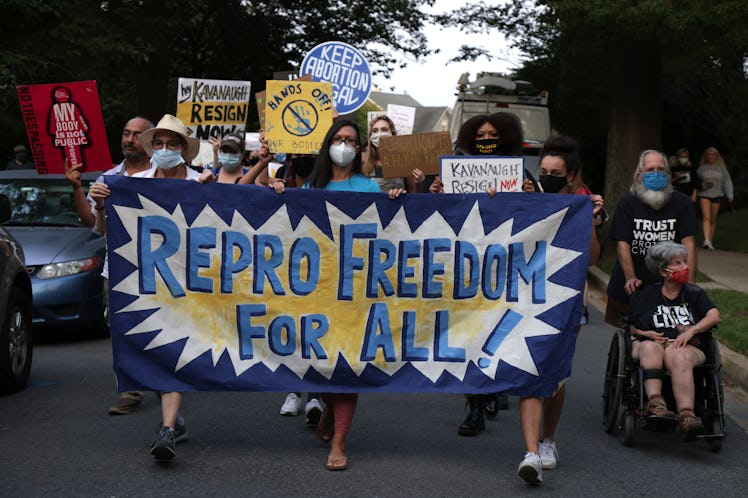
You Should Know About This National Abortion Bill To Protect Reproductive Rights
It’s pretty urgent right now.
As anti-choice state lawmakers continue chipping away at reproductive rights for pregnancy capable people across the country, on Sept. 24, the U.S. House voted to approve a bill that aims to safeguard access to abortion care. Called the Women’s Health Protection Act (WHPA), the bill passed by a 218-211 vote in the House — but will it survive in the Senate? Here’s what you need to know so far.
According to the bill’s advocacy site, ActForWomen.org, the WHPA would “create a statutory right for health care providers to provide abortion care” before fetal viability (around 22-24 weeks gestation) on the national scale. It also codifies the “right for their patients to receive that care, free from medically unnecessary restrictions” that impede access to abortion care. Additionally, the bill would prohibit states from placing restrictions on abortion after fetal viability, when the pregnancy poses a risk to the patient’s life or health.
The bill would standardize the right to abortion nationwide — currently, under the Supreme Court precedent of Roe v. Wade, the 1973 case that legalized abortion, states have the ability to impose restrictions at their discretion, as long as they don’t cause an “undue burden” on a patient. These restrictions can include measures like mandatory waiting periods, counseling, two-trip requirements, and parental involvement for minors. This patchwork of regulations leads to wildly differing levels of access from state to state, including states where abortion has become nearly inaccessible. And some states are prepared for outright bans: As of September 2021, 26 states are “certain or likely” to ban abortion should Roe be overturned by the Supreme Court, according to think tank the Guttmacher Institute.
The WHPA would prevent that. Should the bill be codified into law, it would ensure that abortion remains legal nationwide, even if the Supreme Court ultimately overturns or otherwise strips the Roe decision.
While the WHPA passed the House, the legislation is unlikely to advance past the Senate, where it’s likely to be filibustered. All Democrats and 10 Republicans would need to support the bill to reach the 60-vote requirement to override a filibuster — which is unlikely to happen amid party divides. Additionally, while the bill is co-sponsored by the majority of Senate Democrats, it’s unlikely to gain the support several key Democrats, such as Pennsylvania’s Bob Casey, who has previously voted for abortion restrictions, and West Virginia moderate Joe Manchin.
Passing the WHPA is especially urgent amid recent anti-choice attacks on reproductive rights, such as Texas’ strict six-week abortion ban, Senate Bill 8 (SB8), which went into effect on Sept. 1. This bill offers no exceptions for rape and incest, and allows private citizens to take the law into their own hands to essentially become “bounty hunters” via private lawsuits against anyone “aiding and abetting” an abortion that violates the law. In a Sept. 2 statement, House Speaker Nancy Pelosi called the law “the most extreme, dangerous abortion ban in half a century,” saying its purpose was “to destroy Roe v. Wade.” Lawmakers in several other states — such as Arizona, Arkansas, Georgia, Indiana, Mississippi, Missouri, North Dakota, South Carolina, South Dakota, and West Virginia — have voiced their intentions to introduce copycat bills to restrict abortion access. On Sept. 22, legislators in Florida filed House Bill 167 (HB167), which directly mirrors Texas’ abortion ban.
Meanwhile, on Dec. 1, the Supreme Court is set to hear Mississippi’s Dobbs v. Jackson Women's Health Organization case, which will determine whether or not state laws that ban abortions pre-viability are unconstitutional. However, this is not the first time the court has weighed in on abortion in recent months. On Sept 2, the Supreme Court declined to temporarily block SB8 from taking effect in Texas, leading many advocates to worry the court will ultimately rule in favor of upholding Mississippi’s law.
While the Supreme Court’s decision remains unclear as abortion rights continue to hang in the balance, one thing is certain: Passing the WHPA may be especially urgent now.